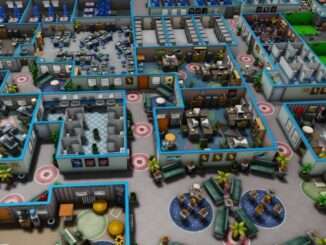
The following is “a few” pointers I’ve learnt from playing mostly in Legendary difficulty -anything that keeps you alive in Legendary will work better in lower difficulties.
Tips to Play the Game
Focusing on one single genre (well, two, because you will be penalized for not having a sub-genre at some point after 1980) will let you grow your IP. The IP mechanic may be the most important one when it comes to sales – a mediocre (70%) game from a strong (3.0+) IP can sell a lot, even in Legendary.
The higher the difficulty, the tougher the game gets. Some things that don’t really matter in Medium will matter in Hard, and in the difficulties above they’ll be even more important, with Legendary basically wanting you to lose (and not hiding it.) Hard is still in the “nice” part of the difficulty scale, but definitely not a difficulty you can breeze through without at least some awareness of what exactly makes a game “good” in MGT2.
“Upsizing” your games depends on your profit, the number of gameplay features you have for the genre you choose, and your potential sales. In general, upsizing is something to do when your current games aren’t getting good enough reviews, or enough profit, and you’ve outgrown the number of gameplay features they have as limit by a lot. For example, I stay with B games until the (early) nineties. I usually recommend not upsizing too early, as it can and will bring your company down – because it’s not just the $300k difference from B to B+ that you have to keep in mind, but the review score requirements that come with a larger game. What lets you get a 90% in a B game may not even be enough to get you an 80% for a B+ game, and the difference in sales caused by lower review scores can make you go from a B game that earned you $700k to a B+ game that loses you money.
Don’t chase after “trends.” They give a laughably low boost to sales, but you sacrifice focus while doing this, and that can be harmful to your review score (and by extension, your sales and profit.) You’ll be chasing after a single-digit increase in sales that might cost you 20% (or more) of your potential profit from using genres and topics your team has not yet mastered. Not a fair trade at all.
About the above: The “stars” under each element of a game are the experience your team has in them. The more stars an element has, the more benefits you get from it. But also, the less stars it has, the more it impacts your reviews (negatively.) This is why focusing in a couple genres and a couple topics can be quite the powerful tool in early game. Later on, when you’re swimming in hundreds of millions of cash? Make one game of every genre and every topic, you’ve earned it.
Games are not just measured by “sliders.” Besides the experience mentioned above, you also have stat points – these are given by either gameplay/engine features, or (largely) by your employees. There’s a simple rule I call “throw people at problems until they stop being problems.” This game can be survived with just a handful of people at first, but later in the game, if you only have a few employees, they won’t be able to add enough stat points to your games to make them good. The stats needed increase every year, so a game that has enough stats to become a 98%-100% game in 1976 will be at best a mediocre game in 1986, and absolute garbage in 1996.
I think the difference between Medium and Hard is that some of the debuffs aren’t around in Medium, so things you did in Medium with no consequence now have consequences. However, I don’t play below Very Hard a lot, so I honestly forgot what debuffs work at what difficulty level.





Be the first to comment